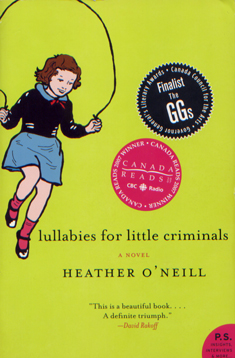A child without a childhood
 CREDIT: HARPERCOLLINS PUBLISHERS (PUBLISHER), JAMIE KERNER-SCOTT (COVER)
CREDIT: HARPERCOLLINS PUBLISHERS (PUBLISHER), JAMIE KERNER-SCOTT (COVER)Lullabies for Little Criminals reminds readers that the poverty and suffering that we see happening around the world is happening in our own backyard.
I know that I lived a sheltered childhood. My parents were home every night for dinner and were always there to help me with my homework if I needed it. My friends were as straight-laced as I was; we only ever got in trouble for giggling too much during class. I was kept safe from the dangers of the world for a long time, much longer than most, I believe.
But not every child is so lucky.
Lullabies for Little Criminals by Heather O’Neill tells the story of one such child, a child whose life is so full of misery that most adults would struggle to deal with the hardships she faced.
Born to teenage parents, Baby is a twelve-year-old girl growing up in poverty in Montreal and for her, life just isn’t fair. Living with her mostly absent father Jules, a heroin addict, she struggles to make the right decisions while having almost no positive role models to look up to.
Baby’s life is just one unfortunate experience after the other. She almost never gets a break and when she does its short-lived. It seems like Baby is on the path to end up just like her father and his friends, even though she’s intelligent, excels at school and is an extremely caring person.
One of the most incredible things about Lullabies is how Baby somehow manages to hold onto her loving nature. Even the littlest show of kindness from someone who cares, be it a foster parent or a friend, and Baby holds onto those memories and they help her get through some of the darkest moments of her life.
This is most evident when Baby is lured into the hands of Alphonse, a local pimp. Even while she is being abused by him, be it physically, emotionally or sexually, she thinks about the things in life that make her happy, especially her friend Xavier. In her darkest moments, her happy thoughts are all she has.
And that is the point of Lullabies. Children have the ability to compartmentalize their trauma in ways that adults grow out of. It’s incredulous that Baby can endure so much trauma and seemingly bounce back with ease. But just because she can doesn’t mean she should have to.
It’s easy for us as Canadians to imagine poverty as bone-thin children in a faraway country, but what’s hardest to accept is that these conditions exist in Canada as well. Baby’s story may be fictional, but the reality of Lullabies for Little Criminals is that the same things could be happening to a child today.
The novel is not biographical, but author O’Neill said she can relate a lot to Baby’s character, having grown up in Montreal as a child in poverty.
“In Lullabies, I wanted to capture what I remembered of the drunken babbling of unfortunate 12-yearolds: their illusions, their ludicrously bad choices, their lack of morality and utter disbelief in cause and effect. I wanted to describe the bittersweet relationships between children who hate themselves, but are madly in love with and make heroes of one another.”
Lullabies for Little Criminals is a difficult novel to read, but a necessary one. As a finalist for the Governor General’s Literary Award and the 2007 winner of CBC Radio’s Canada Reads competition, it is a must-read for Canadians.














